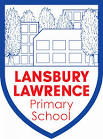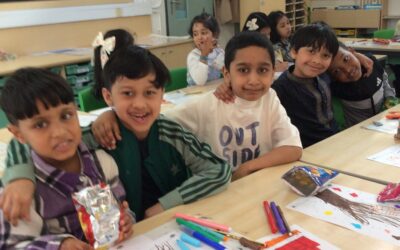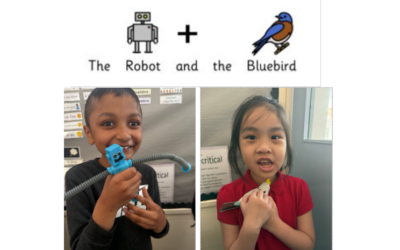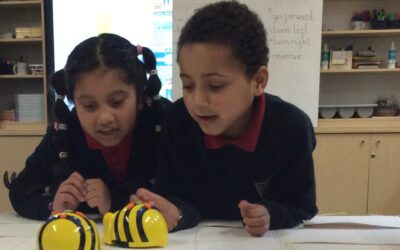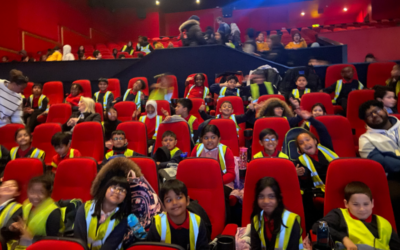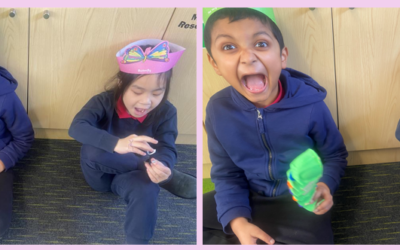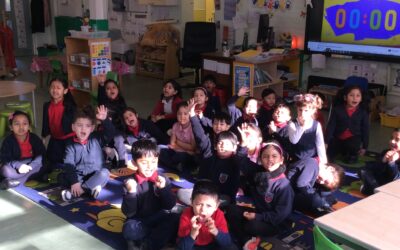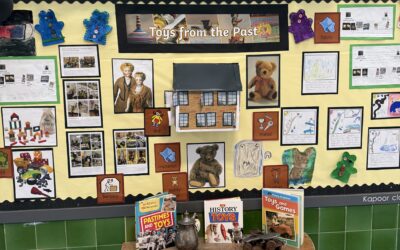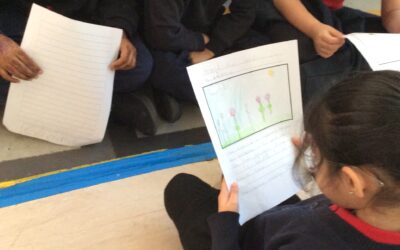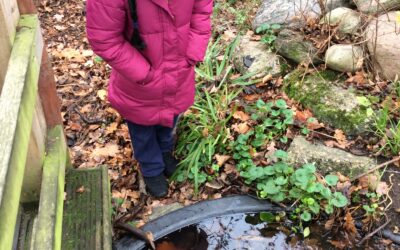Our aim is for all children to leave Lansbury Lawrence as fluent and confident speakers, readers and writers to enable them to be effective communicators.
At Lansbury Lawrence, we follow the new National Curriculum for English. Our English curriculum is built around a core literature spine of well-chosen, quality texts and stories, linked as closely as possible to our termly themes.
Speaking and Listening
At Lansbury Lawrence we believe that effective development of children’s speaking and listening skills are fundamental to building the vital life skills of reading and writing. From day one in nursery through to their last day of year 6, it is a core focus of the children’s daily activities.
Children hear excellent models of language from staff and a wide range of vocabulary. They are given opportunities to voice their thoughts and opinions throughout all lessons with oral storytelling, drama, discussion and debates taught across the school. Essentially, speaking before writing enables children to prepare and rehearse their ideas before writing them down. Additionally, children are given opportunities to perform in their class and to wider audiences.
Reading
Our aim is for every child to leave Lansbury Lawrence as a fluent, confident and independent reader.
We believe that reading should be a pleasure, but we recognise that children have to be confident with the skills of reading and so we aim to give them the skills, as quickly as possible.
Lansbury Lawrence Reading Progression
Phonics
Children begin to learn to read by using phonics. Phonics help children to decode new written words by sounding them out using their phonic knowledge.
Early phonics are introduced in nursery through rhymes, singing, stories and play, helping children to start to learn the sounds that letters make.
We use a synthetic approach to teaching phonics using the accredited THEP Phonics scheme. This is taught systematically from phase 1 in the nursery through to phase 6 in year 2, in daily phonics sessions.
Alongside the phonics sessions, children read decodeable books, matched to their phonics stage, in daily guided reading sessions. These are sent home for children to read to an adult to help them build their word reading fluency.
The Phonics Screening Check
Children’s phonic knowledge is tested at the end of Year 1, through a statutory national test. If they do not achieve the threshold score the test is repeated at the end of Year 2.
The large majority of children complete the phonics programme by the end of Year 2. If, through our assessment, we find that some children still have gaps in their phonic knowledge, an intervention programme is put in place in Year 3 and throughout Key Stage 2, as necessary.
Reading for meaning
To be able to understand what they read, children need to be fluent word readers and have good language comprehension.
We develop children’s reading fluency and comprehension skills through daily reading sessions. In reception, year 1 and year 2, children have a daily guided reading session. In years 3-6, children have a daily whole class reading session.
In these sessions, children read a range of stories, non-fiction and poetry. The children practise their reading strategies, learn new vocabulary, re-read texts to develop fluency and develop their comprehension skills through discussing answers to questions about what they have read.
The Joy of Reading
We want the children at Lansbury Lawrence to love reading!
We provide many opportunities for children to develop a love of books and reading from the moment they start nursery. Each class teacher reads a story or a class novel to the children every day. Children are given time to choose books from the class or the school library and to take these home. Home reading is very important and we encourage parents to read or share a book with their child each evening. Books and reading areas are available to children at lunch times.
Children in years 3 – 6 use the Accelerated Reader programme to help them choose books. When they have read a book they can take a quiz about what they have read.
We celebrate events such as World Book Day, invite authors to come in to school and take part in reading challenges such as the Tower Hamlets Book Award and the Ideas Store Summer Reading Challenge.
Reading across the Curriculum
We have invested in buying books which link to our wider curriculum topics so that children have as many opportunities as possible to read across the curriculum in lessons and independently. This supports children with their understanding of their current topic and helps them to develop a wide vocabulary.
Parental Engagement
Children are strongly encouraged to read regularly at home with parental support.
We host reading workshops for parents to give guidance about how we teach reading in school and how to help support with reading at home.
Writing
We build our teaching of writing around a core literature spine of stories, non-fiction texts and poetry, closely linked to our termly themes, to provide excellent models of writing.
Writing is composed of:
- Transcription – handwriting and spelling
- Composition – generating ideas, structuring content
Children are taught to generate ideas, to plan and to edit their writing, thinking about the audience, purpose and effect.
We teach children accurate letter formation and to develop fluent, joined and legible handwriting. In addition, following the completion of the phonics programme, children are taught spelling throughout years 3-6 and to understand the spelling structure of words. We use the no nonsense spelling scheme.
Lansbury Lawrence Writing Progression
Where Has Spring Gone?
Can you believe the Spring Term is already over? It feels like we blinked and suddenly the daffodils were blooming and the classroom was full of even taller, more confident, and incredibly proud Year 2 children! Time really does fly when you're having fun—and what a...
The Robot and the Bluebird
Hello Lansbury Lawrence! Link to our first blog – https://lansburylawrence.towerhamlets.sch.uk/our-successful-writing-in-year-3/Link to our second blog – https://lansburylawrence.towerhamlets.sch.uk/the-cave-baby/Link to our third blog -...
STEAM and World Book Day in Delaunay
Recently, we celebrated STEAM and World Book Day with exciting events that piqued our students' incredible capacity for curiosity and imagination. All STEAM ahead! Let's get going . . . It was so much fun : ) Using miniature robots, we explored the world of STEAM...
We got to meet an Author!
Yesterday, we went on a very exciting trip. We met an author in real life for the first time ever! We met Joseph Coelho who wrote Our Tower. We felt very privileged to meet him because we read his lovely book, used it to innovate and create our own stories. In Year 2,...
The Very Hungry Caterpillar
Hello Lansbury Lawrence!Link to our first blog – https://lansburylawrence.towerhamlets.sch.uk/our-successful-writing-in-year-3/Link to our second blog – https://lansburylawrence.towerhamlets.sch.uk/the-cave-baby/ Last half term, we read The Very Hungry...
Hamilton Class learn together and play together!
Our day is very busy. We start with early morning learning at 8.45 am, we then move swiftly on to the register, followed by phonics, then guided reading and then literacy. Phew! We then stop have a good run around outside or play inside at the many activities. After a...
End of Spring Term 1: Toys: Why have Toys changed over time?
As we reach the end of Spring Term 1, let's look back at all the exciting things we've learned this term! We’ve learned about toys from the past, practiced maths with doubles and place value, and written stories about lost toys. Let’s see what we've discovered! In...
Sharing Stories, Creating Memories: Year 2 & Year 1 Together
What a fantastic week it’s been in Year 2! The children have been bursting with creativity as they wrote their own versions of Beyond the Pond. They imagined their own characters and settings, crafting unique stories all by themselves.After lots of hard work editing...
Adventures Await: Year 2 Takes a Dive into Beyond the Pond
What a fantastic beginning to the term! Last week, our Year 2s have been introduced to the charming book Beyond the Pond by Joseph Kuefler. To kick off the learning in a fun and engaging way, we set the scene by gathering around, feeling cosy, and taking a trip to the...
Discovering the Wonders of Nature with Year 2
This term, our Year 2 classes have been having an exciting time learning all about Living Things and their Habitats! They’ve been lucky enough to spend time in our wonderful Edible Garden, where they’ve been exploring the plants and animals with the help of Joe and Ms...
